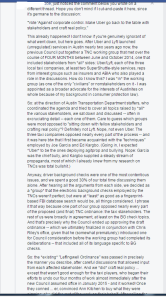I don’t like long circular arguments. I like looking for short-circuits to avoid them. So my response to Dan Keshet’s blog post (which doesn’t allow comments, grrr) is this post.
I served on the UTC from 2000-2005 and dealt with the cab companies in the policy arena many times. It was by far the least attractive part of serving the city. The cab company leadership were, pure and simple, jerks. When ADAPT came in to our meetings and behaved abominably, at least they had a good motive behind it and some justification for their frustration. The cab company representatives (sometimes up to and including their owners) were simply exploitative and entitled jackasses.
Uber is also horrible. They have bullied journalists. They have engaged in tactics that might be as bad as what the cab companies did back in my day. Lyft is a lot better.
But fundamentally speaking, I want to know whether cab companies are any better today (did the threat of competition make them improve their attitude?), because the choice in the election in May is between rules written by the cab companies and rules written by a working group that both cabs and uber/lyft participated in. So let’s look at how that went down. Here’s how the citizen representative on that working group described it (click on picture to expand):
That makes it simple for me – short-circuit the endless debate: we get to choose between rules written by the cab companies and rules written by a group that actually tried to compromise, and in that group the cab companies were by far the worst actors. So the threat of competition didn’t make cab companies try to behave better; it made them behave even worse.
So I’m voting in favor of Proposition 1 and urge you to do the same.
